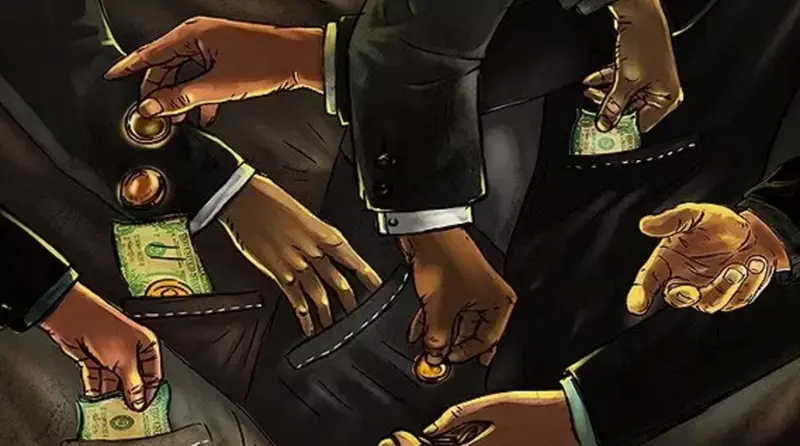"The Big Short" in China's real estate market
In my earlier articles, I have repeatedly recommended a movie from the United States called "The Big Short" to my readers.
This movie vividly and thoroughly depicts the remarkable stories of three brave and wise investment teams against the backdrop of the real events of the financial crisis that shocked the world in 2008.
The reason I strongly recommend this movie is that it teaches us a bloody lesson about a fact I have emphasized repeatedly in my articles:
Investment often only requires following the most basic and simple essence of things, without being deceived by their glamorous appearances, especially not to blindly trust any so-called "authority."
Today, such a story is playing out again. However, this time, it is not happening on Wall Street, but in our country's real estate market.
The "XXX Daily" published a lengthy article detailing some short-selling events that have occurred in our real estate market since 2016.
This article focuses on two teams.
One team discovered clues from sales in a major city in northern China; the other found disturbing signs from an on-site investigation of Evergrande.
2016 was indeed a year of continuous boom in the real estate market in China.
Parker Quillen, a hedge fund manager from New York, was shocked when he visited a high-end real estate project in northern China and found that the sellers were promoting the project based solely on guesses about customer interests, without any investigation into the project's feasibility.
After returning to New York, he began to short assets related to Chinese real estate.
Meanwhile, two accountants from Hong Kong, Gillem Tulloch and Nigel Stevenson, arrived in mainland China.
As they drove across various parts of China, they saw vacant buildings and unfinished projects that shocked them, and they investigated Evergrande's 40 projects in 16 cities.
Their conclusion was that many of these assets were "zombie assets," with little to no income.
Even in a port city just a few hours' drive from the North Korean border, Evergrande had a project with six residential buildings. However, the buildings were abandoned, with no workers, no residents, and no sales personnel. Yet, Evergrande still regarded this project as a quality asset on its books.
The two accountants also paid special attention to Evergrande's parking garages. They found that many garages were almost empty. They estimated that Evergrande had built about 400,000 parking spaces but struggled to rent or sell them. Yet, in the audit reports, Evergrande still valued these parking spaces at $7.5 billion, or nearly $20,000 per space.
Later that year, the two accountants concluded in a report to their clients that Evergrande was insolvent and its equity was worthless.
Of course, the conclusions drawn by these two teams received embarrassing feedback from both Evergrande and the so-called "authoritative institutions" at the time, as well as from the booming market:
Evergrande publicly refuted these conclusions and provided audited financial statements.
The "XX Daily" sternly rebutted: certain institutions "lack understanding of (Chinese) companies," and these institutions "exaggerated the potential risks of the Chinese economy and companies," accusing these forces of helping short-sellers.
Ironically, in the following year, 2017, Evergrande's housing sales increased by 11%, and its stock listed in Hong Kong soared by 458%.
Moreover, international institutions, including a host of top-tier capital, seemed to completely ignore these risks and continued to pour funds into Evergrande to purchase its bonds, seemingly unconcerned about Evergrande's future ability to repay.
These top institutions included Goldman Sachs, Morgan Stanley, BlackRock, Fidelity, Invesco…
An executive from a hedge fund later recalled that he was not unconcerned about the risks, yet still purchased these bonds. On one hand, it was because other companies were buying them, and if he didn't, his short-term performance would lag, potentially leading to his dismissal. On the other hand, despite the data and logic being undeniably clear, few were willing to believe that the tide would eventually recede, given Evergrande's still booming performance and rising stock price.
Even the two Hong Kong accountants who discovered the issues said that although they informed their clients about the serious problems with Evergrande in their report, the clients seemed indifferent and continued to ignore the risks, going their own way.
Why did these people ignore the potential risks despite knowing they existed?
Because they all firmly believed in a so-called "fact": the Chinese government would not allow the real estate market to collapse.
At this point, I am reminded of a scene from "The Big Short": then-Federal Reserve Chairman Ben Bernanke stated during a congressional hearing that the U.S. real estate market had not experienced systemic risk since 1929.
This statement was viewed by the American financial community at the time as an absolute guarantee of confidence and was used by Wall Street institutions to mock those who were bearish on the U.S. real estate and financial markets.
In this process, although the first investor, Quillen, increased his short position on Chinese real estate after returning to New York, the market's short-term "abnormal" feedback also subjected him to unforgettable inner turmoil.
In his words:
Shorting Chinese real estate stocks is like talking to the devil, who promises that a $10 stock will drop to zero in two years. But what the devil doesn't tell you is that in those two years, the stock will first rise to $100 before dropping to zero.
Fortunately, he endured this torment and ultimately reaped substantial rewards.
This Saturday (May 11) at 8 PM, we will hold an online discussion on Twitter. For details, please see the link below:
++https://x.com/DaosViews/status/1787331370689446081++























